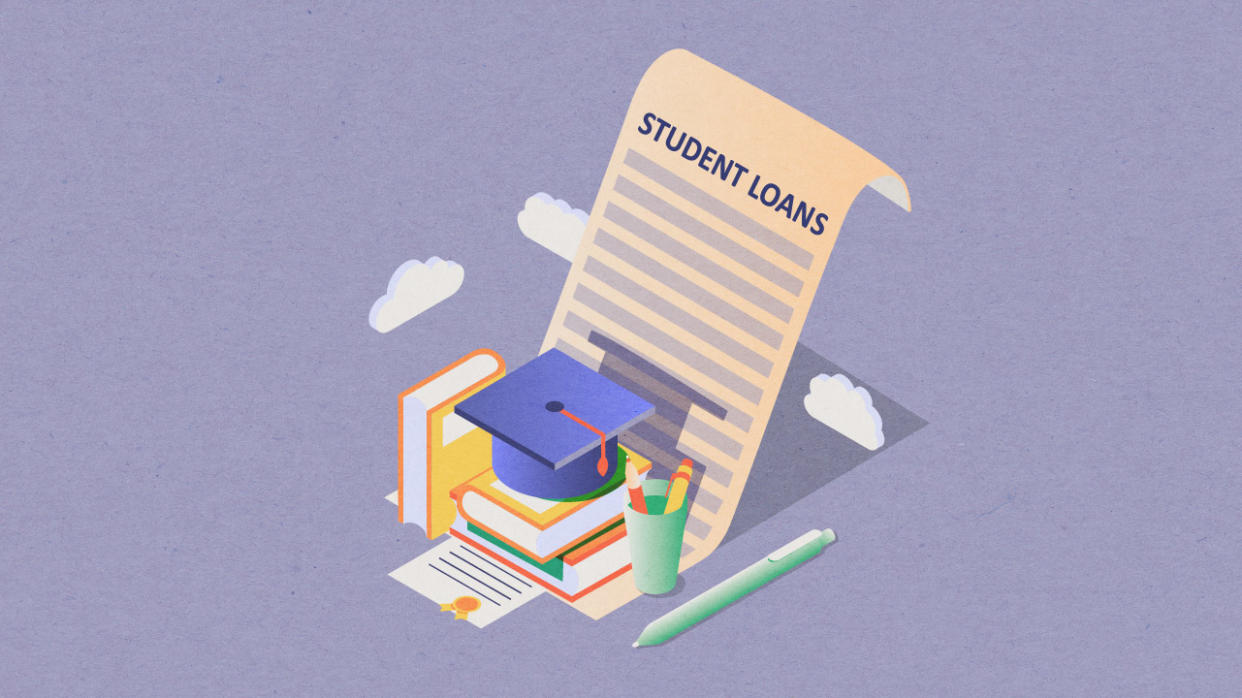Loan forgiveness for defrauded students is expanding — here’s how to know if you qualify

If you have student loans, you’ve probably fantasized about a magic button that can make them disappear. Sadly, no such button exists.
But the next best thing is available to student loan holders who feel they were misled or lied to by their school. It’s called borrower defense to repayment, and here’s what you need to know.
What is borrower defense to repayment?
Borrower defense to repayment (sometimes referred to as “borrower defense loan discharge” or simply “borrower defense”) is a federal student loan forgiveness program managed by the Department of Education. Through the program, borrowers who believe their school defrauded them or violated state consumer protection laws can petition to have their federal student loans forgiven.
Borrower defense was added to the Higher Education Act in 1993, but it was rarely used before 2015, when students of the now-shuttered for-profit college company Corinthian Colleges organized to demand debt relief from the government under the policy. For decades, Corinthian had lied about job guarantees and other accolades to convince students to take out loans to pay their inflated tuition for an empty education that meant little to employers. Although it’s taken students years to see the cash, the government agreed to forgive the federal loans to Corinthian students and to create an official procedure for defrauded students to apply for forgiveness.
Borrower defense has helped more than 100,000 people erase a combined $2 billion in student debt. The DOE under Trump raised the burden of proof for proving fraud. But the Biden administration has made it easier to apply and qualify for borrower defense. In February, the Biden administration erased $415 million in loans for 16,000 borrowers who attended for-profit schools like DeVry University, Westwood College and ITT Technical Institute.
While it remains difficult to prove fraud against an educational institution, according to Harvard Law School’s Project on Predatory Lending, “now is a good time to apply.”
What does “defrauded” mean, exactly?
To defraud someone means to obtain money from them illegally. For a college, that means deliberately misleading, cheating, manipulating or making false promises to prospective students to get them to enroll and pay tuition. Borrower defense relief typically involves institutions that falsely advertised or lied to students about:
Program costs, including tuition, fees and living expenses
Admissions policies or selectivity rates
The qualifications of their faculty
The number of credits or courses needed to graduate
Post-graduation employment prospects
Credit transfers
Loan details
The availability of career services like job-hunting assistance, resume writing and interview prep
Their accreditation with third-party agencies
Who qualifies?
Anyone with federal student loans who suspects their school misled them can apply for borrower defense. In theory, anyone who can prove fraud is eligible, but so far, only students of for-profit colleges have successfully had loans canceled under the program.
Students of traditional universities haven’t had much luck with borrower defense, despite increasing scrutiny of the legality of financial aid practices at major schools. Still, advocacy groups like Harvard Law School’s Project on Predatory Lending and the Debt Collective encourage all students who believe they may have been defrauded to apply.
If a school shuts down before a borrower has completed their degree, a student can also seek relief through a separate program called Closed School Discharge.
Can I apply if I have private loans?
Unfortunately, no. Even if your school is guilty of fraud, you’re still on the hook if you took out a private loan. Borrower defense only applies to the following types of direct federal student loans:
Direct subsidized loans
Direct unsubsidized loans
Direct PLUS loans
Direct consolidation loans
Should I apply?
If you have federal loans and believe your school defrauded you, it can’t hurt to try, especially since the DOE is obligated to investigate every claim and you’re not required to make payments while it’s under review. But there’s a catch: your loan will continue to accrue interest, even in forbearance.
If other alumni or students at your school have successfully received borrower defense, you should definitely apply. As of February 2022, at least some students of these schools have applied for and received relief:
Corinthian Colleges (Everest, Heald, Wyotech)
ITT Tech
DeVry University
Westwood College
Marinello School of Beauty
Minnesota School of Business/Globe University
Court Reporting Institute
Suppose you attended a for-profit college that’s been investigated or sued for fraud or for breaking other consumer protection laws. In that case, you should apply, even if there aren’t known examples of students receiving relief. In October, the Federal Trade Commission told 70 for-profit colleges and universities that it would begin cracking down on false claims used to attract students. Here is a list of the schools the FTC put on notice.
How do I apply?
You can submit a claim online through the DOE’s borrower defense portal (found here). You can also fill out a PDF and return it via email or regular mail.
You’ll need the username and password you used for your Federal Student Aid account, the name of your school and program, the dates you attended, and any documentation of possible fraud committed by your school. You should offer as much detail as possible: emails, transcripts, enrollment agreements and promotional materials. Also, list any lawsuits against your school.
New York Legal Assistance Group offers application guides in English and Spanish. You can find resources with The Debt Collective’s community forum dedicated to borrower defense. There are also nonprofits, legal aid and other groups that can help.
If your claim is approved, you could receive full or partial cancellation. You’ll only receive a refund for previous payments if you apply within three years of leaving school.
Borrower defense is far from a magic button, but if you feel your school seriously harmed you, it could be a game-changer.
View the original article at Chegg Life and signup for the Chegg Life Newsletter
Related...

